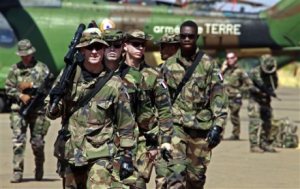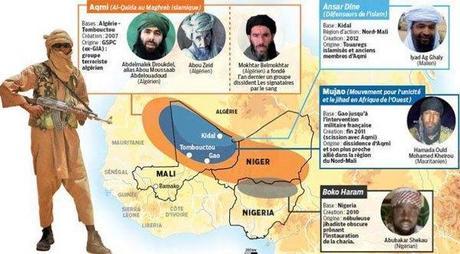 Just like Libya, the “good guys” in Mali – the government army – are being accused by Amnesty International of extra-judicial killings. Today the Observer reports first-hand accounts of human rights abuses and sexual crimes, once again raising the question of whose side, if any, the west should be on. Or whether – as I argued a few days ago - it should be Africa finding solutions to the Mali crisis.
Just like Libya, the “good guys” in Mali – the government army – are being accused by Amnesty International of extra-judicial killings. Today the Observer reports first-hand accounts of human rights abuses and sexual crimes, once again raising the question of whose side, if any, the west should be on. Or whether – as I argued a few days ago - it should be Africa finding solutions to the Mali crisis.
John Rees, of the Stop the War coalition, said on Russia Today that the record of the west in Iraq, Afghanistan and Libya is that military action has led to al-Qaeda groups going into those countries where they weren’t before. Drone attacks are already acting as a recruiting sergeant for extremism and the current action in Mali is likely to intensify that.
David Cameron said today that the north African terrorist threat could take decades, echoing the words of one Tony Blair after 9/11. The former Prime Minister was proved right, if ‘right’ is the right word considering that 919,000 people have been killed since 2001 according to conservative estimates.
Last year the Pentagon announced that it was redeploying 3,000 troops from Afghanistan to various African nations in what seems like a deliberate attempt to move George W Bush’s infamous ‘axis of evil’ to the continent of Africa.
In the last two or three days France has been trying to get west African nations to support their military action with Nigeria leading a force comprised of soldiers from Chad, Benin, Ghan, Niger, Senegal, Burkina Faso and Togo but it could be weeks before they are on the ground.
West African leaders can no doubt see it is in their interests to reduce the threat from Islamic terrorist groups whose range spans many borders right across the Sahal from Senegal on the west coast to Ethiopia on the east coast.
This graphic shows that in Mali alone there are three separate and occasionally competing Islamic groupings whose ‘territory’ covers Mauritania, Algeria, Ghana, Niger and Nigeria.

The French-european military intervention in Mali threatens to unleash an extremist backlash across the Sahal that could potentially envelope a dozen countries in a wider conflict that could more the main ‘theatre of war’ against al-Qaeda groups from Pakistan and Afghanistan to Africa.
The situation in Mali is complicated by the fact that some of the ‘insurgents’ whom the Malian army are fighting are actually from the Tuareg tribe that were trained and armed by the United States to oppose the Islamist radicals but who then switched sides.
The US has been embroiled in Mali since at least 2008 with David Swanson reporting:
“Under the umbrella of its Africa Command, or AFRICOM, the U.S. has been systematically developing ties with the militaries of African countries, including Mali. Washington annually contributes about $140 million to Mali, half of it supposedly for humanitarian purposes, the other half to support “development” and the Malian military, an organization of just 7,000 soldiers. The U.S. State Department handpicks Malian officers for special training in the U.S.
“Over the past few months, almost every incoming flight to Bamako has brought a dozen U.S. soldiers, obvious by their haircuts and by the greeting party that usually includes a couple of men in U.S. army uniform. No one will say how many U.S. military personnel are based in Mali, but there is no doubt that AFRICOM sees Mali as highly strategic to its goals in Africa.”
There’s also the question of whether the Malian government of Dioncounda Traoré actually provoked the current insurgency. Alexander Mezyaev from the Strategic Culture Foundation reports that Malian forces destroyed several historical Muslim shrines in Timbuktu and elsewhere in the country. Is this an administration the west feels comfortable supporting?
And just as western companies, primarily American and British, have bagged oil and reconstruction contracts in Iraq, Afghanistan and Libya, suspicions are growing that Mali – already one of the greatest producers of gold despite being one of the poorest countries – could see more of its’ natural resources plundered once western troops are ensconced there.
Global Research claim that Mali also has vast reserves of uranium, diamonds, bauxite and many more precious resources. And it’s oil is yet to be seriously mined.
All of which raises serious questions about the current situation in Mali. Huge natural resources of value to western multinationals, a Malian government who came to power in a coup d’etat and lacks legitimacy destroying Muslim monuments and committing human rights abuses, and a covert US military counter-intelligence operation in a region which is a potential power-keg that could spark instability and conflict over a much wider area.
It looks like a recipe for disaster. No wonder Cameron is preparing the public for decades of western intervention in the Sahal.
By Lester Holloway @brolezholloway
